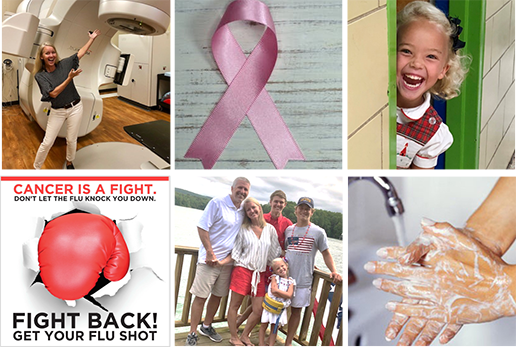You are here
Insider Perspective: How to Stay Healthy During Cancer Treatment

The irony does not escape me: A woman working for nearly a decade on a program for people with cancer is diagnosed with cancer.
I had been waiting nervously all week for the call that would either allow me to heave the biggest sigh of relief or change everything. It was Friday afternoon, and I was in the middle of a conference call planning a new resource for cancer patients when my phone beeped. A quick glance, and I saw it was my doctor’s office. “I’m so sorry, but do you mind holding on for one minute while I answer this call?” I’ll never forget holding my breath. What I heard next took my breath away: “Mrs. Dunbar, we just got the results back from your biopsy, and I’m calling to let you know that your results came back positive for breast cancer.”
Fast forward four months, two surgeries, dozens of doctors’ appointments, 20 rounds of radiation, and here I am, cancer free and writing a blog, not about someone else’s journey with cancer, but about my own. This moment feels surreal, a little sad and very empowering.
With October nearly behind me, marking my first foray into Breast Cancer Awareness Month, I am struck with pride. I am proud of my family, friends and coworkers who supported and uplifted me in ways I could have never imagined; proud of strangers who would squeeze my hand or pat me on the back as I walked out of the radiation clinic every day; proud of my husband who kept me laser-focused and positive; proud of my medical team for their excellent care; proud of myself for following my gut when I knew something wasn’t quite right; proud of the work I do with the Centers for Disease Control and Prevention (CDC) and the CDC Foundation’s Preventing Infections in Cancer Patients (PICP) program, and proud of Amgen for its continued support of this lifesaving program.
While PICP is designed to help cancer patients who are undergoing chemotherapy, its infection control advice and easy-to-understand information were so valuable to my family and me throughout my surgeries and radiation. The last thing I wanted was to get the flu or an infection that would sideline my treatment plan. After all, I had things to do! My oldest son graduated from high school a week before I was diagnosed and my goal was to be healthy enough to move him in to the University of Georgia in the fall as well as see my other son off to his junior year in high school and walk my little girl into her first day of pre-kindergarten—and I was!
In reflecting on Breast Cancer Awareness Month and, more importantly, the brave women fighting this disease or living every day as cancer survivors, we’ve got this! Here are my favorite pieces of advice and PICP resources that helped me stay healthy during my treatment:
- Wash your hands a lot and encourage your family to do the same.
- Get a flu shot and have your family get one too.
- Call your doctor right away if you get a fever. This could be the sign of an infection which could delay your treatments or worse.
- Know the signs and symptoms of an infection.
- Visit preventcancerinfections.org for helpful information in a variety of formats.
- Post this fact sheet on your refrigerator or bulletin board. You can cut out the card at the bottom of the page to keep your doctor’s phone numbers with you at all times.
- Check out my favorite poster on the importance of getting a flu shot.
They say understanding the irony of a situation means that you recognize the strange or unexpected nature of it, or simply put, it’s not lost on you. While I initially felt I had lost so much, I now see the invaluable lessons, relationships and insights I’ve gained.
And, if you’re wondering whatever happened when I switched back over to my conference call that Friday afternoon, let’s just say that we are bonded in a way we never would have dreamed. I count this as another gain.
